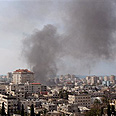
Religious war in Gaza
Gaza clashes are over values, way of life and future Palestinian identity
Israeli media is using the Arab term "falatan" (lack of security) - a state of security lawlessness, a war of gangs and militias. This description is inaccurate. The war is being waged between Hamas and Fatah. The militias and other organizations, ranging from Islamic Jihad to the Popular Front, are not taking part. In fact, they are trying to mediate, reconcile, and end the infighting. The public at large is not participating in this war, it is staying at home.
Hamas embarked on this war with some 10,000 fighters – 6,000 from among the ranks of what is known as the Executive Police Force founded by the Hamas government, and 4,000 armed members of the Izz al-Din al-Qassam Martyrs' Brigades.
The gunmen are well trained and organized within a quasi military organization, and they are equipped with every means of warfare including sniper rifles, communications devices, flack jackets, night vision equipment, Kalashnikov rifles, hand grenades, RPGs and almost limitless munitions. This force is ready for battle, it has been training for the past two years, and is also ready to engage in a civil war.
Up against them are Fatah and Abbas loyalists along with the national security forces who together total some 60,000 gunmen. The majority lacks any formal military training and is fighting with light weapons while suffering from a lack of munitions and logistic means – yet more importantly, they were not trained for warfare against Hamas.
Such a situation can be compared to civil defense forces fighting elite units. In the last few days of fighting Hamas dispatched 100 percent of its forces, while Fatah and its supporters dispatched no more than 10 percent of their combatants.
Although Fatah succeeded in the battle over the Islamic university, it was dealt a severe blow in other places. The majority of fatalities over the weekend came from the Fatah camp. Hamas had the upper hand in this weekend's battles.
This is just the beginning
The Palestinian infighting is no different than other civil wars. This is a war over values, over a way of life, and over the future identity of Palestinian society and state: It pits Fatah's secular democratic nationalism against Hamas' radical Islam.
Hamas is fighting passionately in the name of religion and is backed by the "fatwas"- religious edicts that defines Fatah members as heretics and justifies the killing of Muslims. Such a war took place in Algeria. Fatah sources are saying that the battles are aimed at preventing "Algerization" of the Territories.
Hamas treats Fatah as "mortadin," namely as those who abandoned the way of Islam after the death of the Prophet Muhammad. His successor, Caliph Abu Bakr, issued a religious edict that permits and encourages their killing.
Fatah members, on the other hand, regard themselves as true Muslims and view Hamas as 'khawaraj' - a group that detached itself from the Islamic community, strictly adheres to religious laws, and defines those who do not follow its path as heretics punishable by death.
Fatah and Hamas both believe that the infighting in the Palestinian Authority has just begun. Therefore, Hamas is insisting on establishing a national unity government – under its cover it will maintain its power and continue to instill the values of radical Islam among the population.
Hamas and Abbas want a unity government in order to reach a lull in the fighting for the purpose of strengthening their forces for the next round of battles, which will culminate in either a military victory or a victory at the polls.
A unity government is not likely to bridge the gaps, and the battles will inevitably be resumed. A decision will only be reached after a lot of blood has been shed and after the defeated party will disarm and accept the authority of the victor.
Israel and the entire region would be much better off if Fatah were to win this war.










